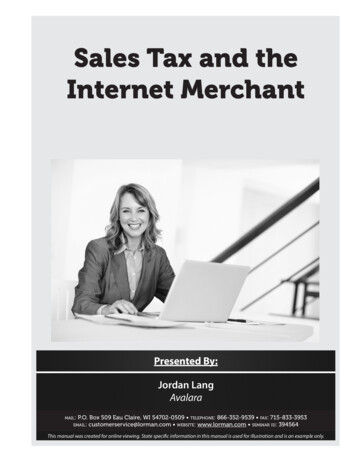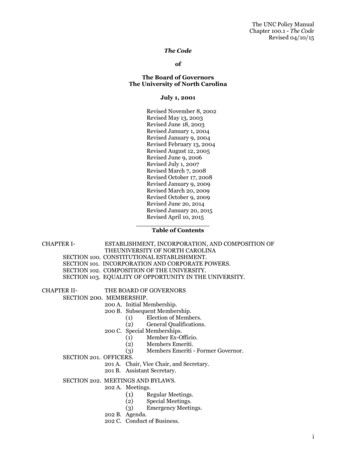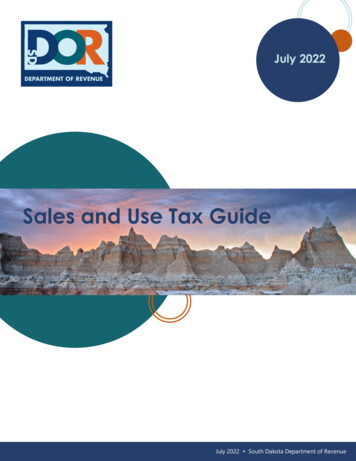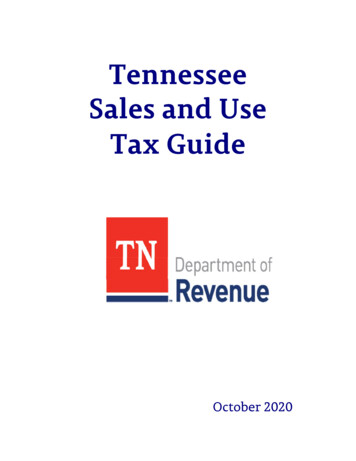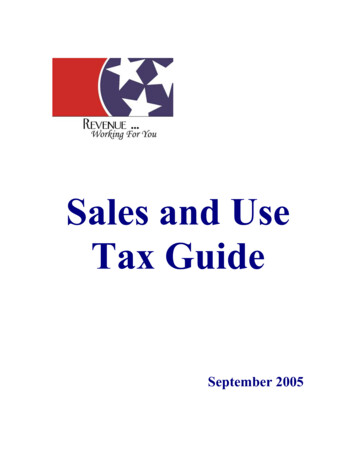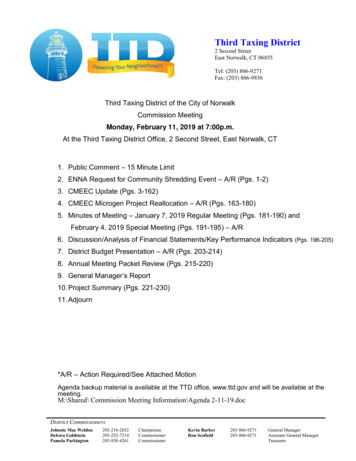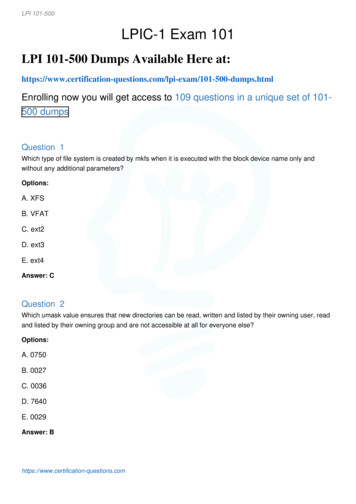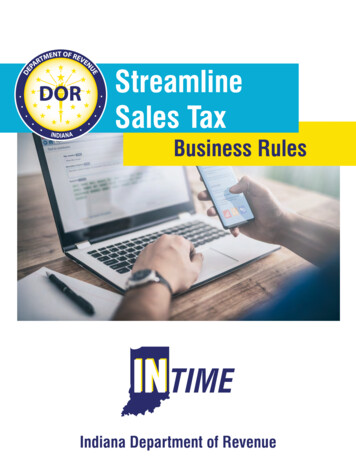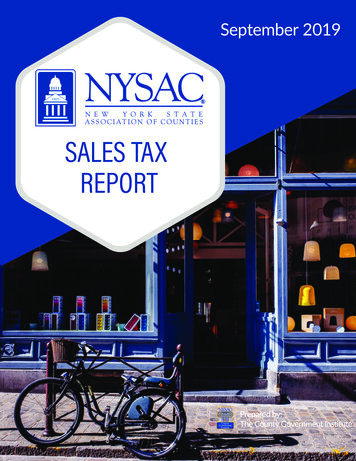
Transcription
Kathleen Sebelius, GovernorJoan Wagnon, Secretarywww.ksrevenue.govKANSAS DEPARTMENT OF REVENUEPOLICY AND RESEARCHRevised Sales Tax Guidelines: Taxing Charges for Computer Productsand Services and Internet Related Sales and ServicesDate Issued: July 23, 2010Tax Types: Sales and Use TaxDocument Number: EDU-71RDepartment of Revenue guidelines are intended to help you become familiar with Kansastax laws and your rights and responsibilities under them. While every attempt is made toprovide you with information that is consistent with Kansas law, nothing in thispublication supersedes, alters, or otherwise changes Kansas case law or any Kansasstatute or regulation. Department guidelines are not legal rulings and any information thatis inconsistent with Kansas law is not binding on either the department or the taxpayer.Not every potential tax situation is covered in these guidelines. If you have any questionsabout how Kansas sales and use tax laws apply to your business, please visit thedepartment's Policy Library on our web site at www.ksrevenue.gov or call our TaxpayerAssistance Center at 1-785-368-8222.Application of this publication. This publication discusses how the Kansas sales taxstatutes currently in effect apply to sales of computer software, software maintenanceagreements, computer hardware, and labor services performed to software and hardware.It revokes and supersedes all earlier department publications and rulings that discuss thesales and use taxation of computer products and services. This publication also explainsthe rules for taxing optional software maintenance agreements that took effect on January1, 2009.The Kansas statutes that tax sales of computer software have been amended manytimes over the past twenty-eight years. A chronology of these changes can be found in aQuestion and Answer that is published in the department's policy library atwww.ksrevenue.org. Taxpayers and others who need to research the sales tax laws forcomputer software that were in place during past years may find this chronology useful.Tax and software terms. Many of the terms used in this publication have a specificmeaning for purposes of the sales and use tax laws. Many of them are defined in K.S.A.2009 Supp. 79-3602. For example, the amount that is taxed is the "sales or selling price"of the goods or services being sold at retail. K.S.A. 2009 Supp. 79-3602(ll). The "sales orselling price," which includes any shipping or postage charges that the retailer bills to thecustomer, is the amount that is multiplied by the combined state and local tax-ratepercentage to determine the amount of tax to charge the customer, collect, and pay to thestate. K.S.A. 2009 Supp. 79-3602(ll). This amount is also called the "tax base," "measureOFFICE OF POLICY AND RESEARCHDOCKING STATE OFFICE BUILDING, 915 SW HARRISON ST., TOPEKA, KS 66612-1588Voice 785-296-3081 Fax 785-296-7928 http://www.ksrevenue.gov/
2of tax," or "purchase price." See K.S.A. 2009 Supp. 79-3602(ee). The term "grossreceipts" generally refers to the sum of all retail sales receipts in a reporting period.For simplicity, this publication will use the terms "selling price" or "tax base" unlessthe context requires otherwise. Compare K.S.A. 2009 Supp. 79-3602(o) with K.S.A. 2009Supp. 79-3602(ee) and K.S.A. 2009 Supp. 79-3602(ll). "Sales tax" or "tax" will refer tothe combined state and local sales or use tax that is lawfully owed. "Sale" will refer tooutright sales, as well as leases, rentals, software license agreements, and similarconveyances unless the context requires otherwise.The terms "prewritten computer software," "prewritten software," and "cannedsoftware" are synonymous. While the term "prewritten computer software" is used in theKansas statutes, the term "prewritten software" will be used in these guidelines unlessotherwise required. "Enhancements or modifications to prewritten computer software,"when such enhancements or modifications are designed and developed to thespecifications of a specific purchaser of the prewritten software, shall be referred to inthese guidelines as "customization of prewritten computer software." See K.S.A. 2009Supp. 79-3602(cc). "Software" means computer software.I. DEFINITIONS. (a) "Custom software" is software that is designed and developed forthe exclusive use and needs of a specific person or business. Custom software becomesprewritten software if it is offered for sale to someone other than the customer for whomit was originally designed and developed. The providing of custom software is considereda non-taxable service.(b) "Prewritten software" is defined at K.S.A. 2009 Supp. 79-3602(cc) as:computer software, including prewritten upgrades, which is not designedand developed by the author or other creator to the specifications of aspecific purchaser. The combining of two or more prewritten computersoftware programs or prewritten portions thereof does not cause thecombination to be other than prewritten computer software. Prewrittencomputer software includes software designed and developed by theauthor or other creator to the specifications of a specific purchaser when itis sold to a person other than the purchaser. Where a person modifies orenhances computer software of which the person is not the author orcreator, the person shall be deemed to be the author or creator only of suchperson's modifications or enhancements. Prewritten computer software ora prewritten portion thereof that is modified or enhanced to any degree,where such modification or enhancement is designed and developed to thespecifications of a specific purchaser, remains prewritten computersoftware, except that where there is a reasonable, separately stated chargeor an invoice or other statement of the price given to the purchaser forsuch modification or enhancement, such modification or enhancementshall not constitute prewritten computer software.(c) "Customization of prewritten software" refers to a service that modifies orenhances prewritten computer software, when such modification or enhancement hasbeen developed and designed to the specifications of a specific customer. Customization
3of prewritten software requires changing, editing, or adding to the source code of theoriginal prewritten software to meet the customer's specifications. Customization doesnot transform the underlying prewritten software into custom software. Customizedprewritten software is still considered prewritten software.(d) "Software source code" means the code written by a programmer using aprogramming language which is comprehensible to appropriately trained persons and isnot capable of directly being used to give instructions to a computer. A source codeincludes related programmers' notes, design documents, and manuals. Source code is aset of programming-language instructions that must be translated to machine instructionsbefore the program can run. It is translated by compilation or interpretation into softwareexecutable code in binary form.(e) "Software executable code" means any object code, machine code, or other codein binary form readable by a computer when loaded into its memory and used directly bysuch computer to execute instructions.II. OVERVIEW: (a) The most common questions that taxpayers ask about softwaretaxation are: How are sales of software taxed?What software services are taxed? What ones are not?How are sales of software maintenance agreements taxed?This Section provides abridged answers to these three questions. Section IV containsmore in-depth answers to these and other questions about how the Kansas sales tax lawsapply to sales of computer software, hardware, and services.(b) How are software sales taxed in Kansas? (1) Software sales can bedistinguished in a number of ways, including whether or not the software is: Operating software, application software, or system software;licensed to the customer under a limited-duration right-to-useagreement rather than being sold outright;sold with a shrink-wrapped box-top or with a tear-open license agreement;delivered to the customer on a tangible storage medium, such as a CD,DVD, or magnetic tape;delivered to the customer electronically via the Internet, telephonemodem, or some other electronic method; ordelivered to the customer by "load and leave."(2) In Kansas, taxability is determined solely by whether the software being sold iscustom software or prewritten software.(3) Sales of prewritten software are taxed both under the specific imposition on salesof prewritten software and under the general imposition on sales of tangible personalproperty. Such sales are taxable regardless of the method of delivery, which may be madevia a tangible storage media, electronically, or by "load and leave." See K.S.A. 2009 Supp.79-3602(pp); K.S.A. 2009 Supp. 79-3603(a); and K.S.A. 2009 Supp. 79-3603(s).
4(4) Charges for custom software are not subject to Kansas sales or use tax and aretreated as charges for non-taxable services.(5) Charges for customized prewritten software are taxable, the same as charges forprewritten software. However, a service charge to change or modify the software sourcecode to meet a specific customer's special technical or business needs is not taxable,provided the charge for the customization service is reasonable and separately stated onthe customer's invoice. If the charges for the prewritten software and the softwarecustomization service are not separately stated, the entire charge is taxable.(6) Summary: Sales of prewritten software are taxable.Sales of custom software are not taxable.If a software vender bills one charge for prewritten software andanother charge for customization of such software, the charge for theprewritten software is taxable while a reasonable and separately-statedcharge for the customization service is not. If the two charges arelumped together, sales tax applies to the entire amount being billed.(c) What software services are taxed in Kansas? What ones are not? (1) Whenprewritten software is sold, the selling price that is subject to sales tax includesseparately-stated charges for delivering and installing the software, as well as "any otherservices that are necessary to complete the sale." K.S.A. 79-3602(ll)(1). See Section IV(b),The tax base for the sale and installation of prewritten software.(2) Kansas taxes charges for "the services of modifying, altering, updating ormaintaining prewritten computer software." K.S.A. 2009 Supp. 79-3603(s). Theseservices always involve the installation of software or software upgrades orenhancements. See Section III(b)(4).(3) Kansas does not tax software customization services when the charges for suchservices are reasonable and separately stated from any charges for prewritten software.Customization services always involve changing the software source code.(d) How are sales of software maintenance agreements taxed in Kansas? RevenueRuling 19-2009-01 sets forth the sales tax treatment of computer software maintenanceagreements, as of January 1, 2009. A maintenance agreement that is required to bepurchased with prewritten software is fully taxable. Taxation of optional maintenanceagreements is discussed below in Section III(d), Software maintenance agreements.Section III(d) also discusses how services performed by a third-party serviceman for amaintenance-agreement provider are taxed.III. COMPUTER SOFTWARE SALES AND SERVICES. (a) Prewritten software,custom software, and the customization of prewritten software. (1) Prewrittensoftware. Prewritten software includes: Any combination or parts of two or more prewritten softwareprograms;customized prewritten software;software upgrades and enhancements for prewritten software; and
5 software that was initially designed as "custom" software for a specificcustomer that is later sold to someone else. K.S.A. 2009 Supp. 793602(cc).The sale of prewritten software is taxable whether it is delivered to the customerelectronically, on a physical medium, or by "load and leave." K.S.A. 2009 Supp. 793603(s). Load-and-leave delivery occurs when the software vendor or its agent visits thecustomer's site, installs the software using a physical medium, and carries away thephysical medium when finished. The sale of a license to use prewritten software for alimited period is taxed the same as the outright sale of prewritten software. See K.S.A.2009 Supp. 79-3602(pp).The use in Kansas of prewritten software that is purchased outside the state withoutpayment of sales or use tax, or at a combined state and local rate that is lower than theapplicable combined Kansas state and local rate, is subject to consumers' use tax. K.S.A.2009 Supp. 79-3702 et seq. The use tax rate to use to accrue the consumers' use tax is thedifference between the combined Kansas tax rates and the combined tax rates of the otherstate. When a retailer fails to collect sales tax on a taxable software sale made in Kansas,the department may pursue either the customer or the retailer for the uncollected tax.K.S.A. 79-3604.(2) Custom software. In today's market, a software designer seldom creates softwaresolely for one customer. Instead, most software is prewritten and can be sold "as is" orcustomized to adapt it to the customer’s special technical or business needs. See Section I,Definitions. When a contract requires entirely new software to be designed, written, andsold to a specific customer for the customer's exclusive use, the sale is not subject to tax.See K.S.A. 2009 Supp. 79-3603(s); K.S.A. 2009 Supp. 79-3602(cc). Any subsequent saleto another user is a taxable sale of prewritten software.(3) Software-customization services and customized-prewritten software. Businessesoften buy prewritten software: (i) from vendors who agree to customize the software to fita customer's special technical or business needs; or (ii) with the intention of hiring a thirdparty to customize the software. The sale of prewritten software is taxable regardless ofwhether it is: (i) sold in its original form; (ii) combined with other prewritten programs;or (iii) customized to meet the purchaser’s special needs. However, the vendor ofcustomized software has the option to charge a separate fee for the softwarecustomization services (i.e. programming) that it or its agent performs to satisfy thespecial order of the customer.The vendor must maintain records that adequately document the extent of thesoftware customization services being performed to prewritten software. As discussedbelow in (a)(4) and (a)(5), software customization requires changing the software sourcecode to meet the specific requirements of the customer. A commercially reasonable,separately stated charge for customizing prewritten software is not subject to sales tax.K.S.A. 2009 Supp. 79-3602(cc). If a vendor elects to charge a lump sum rather thanseparately invoicing one fee for the software customization service and another fee forthe prewritten software being customized, the entire amount that is invoiced is subject tosales tax. When a computer programmer does not sell prewritten software and onlyperforms software customization services, the programmer's charge for the softwarecustomization services is not taxable.
6If a software vendor hires a third-party programmer to customize prewritten softwarethat the vendor is selling to a specific customer, the vendor may issue a resale exemptioncertificate to the programmer. If, after the initial sale, the vendor resells the customizedprewritten software to someone else, the vendor must collect sales tax on the total amountthat it bills for the software. If software customization services are performed to meet theneeds of a specific customer and the vendor does not intend to sell the customizedprewritten software to anyone else, the vendor is not required to charge sales tax on thereasonable and separately stated charge for the software customization services that itbills to the one customer.(4) What are software customization services? (A) To be considered softwarecustomization services (i.e. custom programming), the services being performed mustsatisfy the following two requirements: The vendor or programmer must conduct a requirements analysis todetermine a specific customer's unique needs for the new software orfor the customized prewritten software ; andThe source code for the prewritten software or prewritten programmodules must be changed or added to in order to meet the uniquerequirements of the customer buying the software.(5) Examples and documentation of software customization services. Softwarecustomization services require changing the source code. The following are examples ofsoftware customization services, where those require source code changes to be made: Creating new interfacing logic to meet the customer's specific needs,such as formatting of the interface between the purchased software andother related software or computer systems, including formatting ofgraphical user interfaces;turning functionalities of a program on or off in accordance with thespecific requirements of the purchaser;altering the source code so that the software is compatible with theother software and computer hardware of the software purchaser;data conversion or migration from a legacy system;adding or deleting data fields; andreport modification or generating new reports.The performance of such services is documented by the service provider's records. Thedepartment will review the following records to establish whether or not a source codehas been changed: the contract of sale, logbooks, timesheets, dated documents, sourcecodes, specifications of work to be done, design of the system, performancerequirements, diagrams of programs, flow diagrams, flow diagrams, coding sheets, errorprintouts , translation printouts, correction notes, and invoices or billing notices to thecustomer.(6) What expenses are considered to be incurred as part of software customizationservice? Customers who pay for prewritten software along with software customization
7services are sometimes billed for services a vendor or software programmer provides andfor the expense the vendor or programmer incurs for: Requirements analysis and feasibility studies, including economic andtechnical analysis of existing or potential computer hardware orsoftware needs, identifying information and information access needs,and analyzing business-process analysis done to help a customerimprove its information security, operations, quality control,budgeting, financial statements, etc.;changing source code so that the purchased software will operate;providing consulting services;providing technical instruction;travel, lodging, and meal expenses; andWhen charges on the invoice for these items are commercially reasonable and are brokenout separately between those specifically related to the software customization servicesand those related to the prewritten software, the separately stated charges related to thesoftware customization services are presumed to be non-taxable. This presumption can beovercome if the listed charges related to the software customization services are notreasonable.Whenever software customization services are performed and the customer is billed alump sum for the prewritten software and customization services, the tax base is the totalamount billed to the customer. This includes any separately stated charges for the itemslisted above, including requirements, studies, feasibility studies, consulting services,travel expenses, and so forth. See K.S.A. 2009 Supp. 79-3602(ll). These expenses are alsopart of the tax base whenever hardware or prewritten software is sold and no softwarecustomization services are performed.(7) Software purchased with a computer. A charge for prewritten software that isinstalled in a computer or otherwise sold with a computer is subject to sales tax. If acomputer is sold with custom software or with customized prewritten software and thecharge for the custom software or software customization service is separately stated, theseparately stated customization charge is not subject to tax. If the customization charge isnot separately stated, the entire amount billed to the customer is taxable.(b) The tax base for the sale and installation of prewritten software. (1) Whenprewritten software is sold without any customization services, the selling price includesany separately-stated charges for delivery, installation of the software, and "any otherservices that are necessary to complete the sale." K.S.A. 79-3602(ll)(1). Delivery chargesare taxable whether the software is delivered to the buyer electronically, by tangiblestorage media, or by load and leave.(2) The following are examples of services rendered in connection with the sale ofprewritten software that are taxed as installation services or as other services necessary tocomplete the sale: Requirements analysis and feasibility studies, including economic andtechnical analysis of existing or potential computer hardware orsoftware needs, identifying information and information access needs,
8 and analyzing business-process analysis done to help a customerimprove its information security, operations, quality control,budgeting, financial statements, etc.;system design and development;establishing the compatibility of the software with the hardware andother software products;loading prewritten software into a computer;configuring or setting up the software, provided these services do notinvolve changing the software's source code to meet the specificrequirements of the purchaser (which would be software customizationservices); andinstalling upgrades or enhancements.These charges are taxable whether they are separately stated or lumped together withother charges.(c) Services to modify, alter, update, or maintain prewritten software. (1) Kansastaxes charges for "the services of modifying, altering, updating or maintaining prewrittencomputer software." K.S.A. 2009 Supp. 79-3603(s).(2) Taxable services to modify, alter, update, or maintain computer software alwaysinvolve the installation of prewritten computer upgrades and enhancements. The chargesrelated to the software installation that are listed above in (b) are also taxed as part of thecharges to modify, alter, update, or maintain prewritten software.(3) Taxable services do not include actions that are taken to assure the efficientoperation of prewritten software or hardware, such as deleting or recovering informationfrom a hard drive, virus or spyware removal, or increasing the speed of the computersystem unless the service involves the sale and installation of prewritten software orhardware.(d) Software maintenance agreements. (1) Mandatory software maintenanceagreements sold with prewritten software. A software maintenance agreement is"mandatory" when prewritten software cannot be purchased without buying themaintenance agreement. Mandatory software maintenance agreements are treated as partof the software sale and are subject to Kansas sales or use tax. The charge for themaintenance agreement is fully taxable even when charges for technical support andupgrades are separately-stated on the customer's invoice.(2) Optional software maintenance agreements sold with prewritten software. Asoftware maintenance agreement is "optional" when a customer can buy prewrittensoftware without buying a maintenance agreement for it. When a customer agrees to buyan optional maintenance agreement during negotiations for prewritten software, chargesfor the agreement are sourced as part of the software sale and are taxed as follows afterJanuary 1, 2009:(A) If the charges for Technical Support and Upgrades are not separatelystated, Kansas sales tax applies to 50% of the sales price of themaintenance contract.(B) If the charges for Technical Support and Upgrades are separatelystated, sales tax applies to charge for the Upgrades but not to the charge
9for Technical Support. The estimated costs used to apportion the twocharges must be reasonable and made in good faith. If the estimatedcharges do not appear to be reasonable, the department may assess salestax on 50% of the total cost of the maintenance agreement, along withinterest and penalty.(C) If only Upgrades are contracted to be provided under the optionalmaintenance agreement and the customer is not entitled to TechnicalSupport, charges for the agreement are taxable.(D) If only Technical Support is contracted to be provided under theoptional maintenance agreement and the customer is not entitled toUpgrades, charges for the agreement are not taxable.(3) Charges for upgrades and enhancements for prewritten software are taxablebecause upgrades and enhancements are, by definition, prewritten software. See K.S.A.2009 Supp. 79-3602(cc). Charges for additional copies of operating manuals and foroperating-manual updates for prewritten software are taxable.(4) Optional software maintenance agreements sold separately from or after thesoftware sale. A maintenance agreement may be sold by the software vendor after thesoftware sale is completed or by a different vendor. Charges for these agreements aretaxed as set forth in (2)(A) through (D) but are sourced according to K.S.A. 2009 Supp.79-3670. See K.S.A. 2009 Supp. 79-3602(cc).(5) Custom software. Whether mandatory or optional, maintenance agreements forcustom software are not taxable, provided the software has not been offered for sale tosomeone other than the person for whom it was originally designed and developed. Thecustom-software provider should pay sales or use tax on the printing cost of anyoperating-manual or operating-manual updates that are produced for the custom softwareand given to the custom software purchaser.(e) Sourcing software sales and services. K.S.A. 2007 Supp. 79-3670 et seq. appliesthe destination-based sourcing rules to sales of prewritten software, software maintenanceagreements, and computer hardware. These rules provide:(1) The sale is sourced to the retailer’s business location if the customertakes delivery of the product there.(2) If the retailer delivers or ships the product to the customer, the sale issourced to the customer's location. This provision is not changed by FOBterms.(3) If neither (1) nor (2) apply, then the sale is sourced to the locationindicated by an address for the purchaser that is contained in the vendor'sbusiness records.(4) If neither (1), (2), nor (3) apply, then the sale is sourced to the addressof the purchaser obtained during consummation of the sale. This mayinclude the address on the purchaser’s payment instrument, such as acheck, credit card account, or money order.(5) If the four listed rules cannot be applied, then the sale is sourced to theaddress from which the product is shipped. This includes prewrittensoftware that is delivered electronically.
10IV. TAXATION OF CHARGES FOR INTERNET ACCESS, DIGITALPRODUCTS, WEB PAGE DESIGN, ACCESS TO INFORMATION DATABASES,AND OTHER COMPUTER-RELATED PRODUCTS AND SERVICES. (a)Overview. Kansas does not tax customer charges for accessing the Internet. The State isprohibited from doing so by the Federal Internet Tax Freedom Act (F-ITFA). Internetaccess services and the taxability of transactions arranged over the Internet are discussedin more detail in the next subsections.(b) Internet access services. (1) "Internet access service" means the service ofproviding customers with the ability to access the Internet or World Wide Web. Internetaccess charges are usually billed on a monthly basis and may include a one-time setupcharge. These services include any technical-support that is furnished with the accessservices, such as telephone user support or telephone consulting whether or not suchservices are separately stated on the customer's bill or invoice. Internet access services donot include charges for accessing restricted web sites, downloading information, orsimilar on-line services that are utilized after the network has been accessed. Theseservices, while not classified as internet access services, are not subject to Kansas taxunless they involve the delivery of prewritten software.(2) The F-ITFA prohibits state and local governments from imposing new taxes onInternet access charges. Congress allows ten states that previously taxed Internet accesscharges to continue to do so. Kansas is not one of the ten states and has never taxedInternet access charges.(3) The F-ITFA defines "electronic commerce" as any transaction conducted over theInternet or through Internet access, comprising the sale, lease, license, offer, or deliveryof property, goods, services, or information. F-ITFA does not prohibit Kansas and otherstates from imposing sales or use tax on purchases arranged over the Internet.(4) Under F-ITFA, otherwise exempt Internet access charges may be taxed if theaccess charges are bundled with charges for telecommunications services or other taxableservices, provided that: (A) the Internet access charges are not separately stated on thecustomer's bill or invoice; and (B) the access provider's business records cannot identifyand reasonably establish its costs that are associated with providing Internet accessservices.(5) The F-ITFA does not prohibit Kansas and other states from taxing Voice OverInternet Protocol (VOIP) services. Kansas taxes charges for VOIP services and othertelecommunications services.(c) Purchases of tangible personal property and digital products arranged online. (1) Sales of tangible personal property. Sales of goods arranged over the Internet aretaxable. Whenever an in-state or out-of-state retailer that is required to collect Kansasretailers' sales or use tax accepts an order for goods via the Internet and then ships ordelivers the goods to a Kansas address, the retailer must charge and collect theappropriate Kansas tax on the sale. The tax base includes any shipping and handlingcharges that the retailer bills to the customer. Whenever a
Revised Sales Tax Guidelines: Taxing Charges for Computer Products and Services and Internet Related Sales and Services . Date Issued: July 23, 2010. Tax Types: Sales and Use Tax . Document Number: EDU-71R . Department of Revenue guidelines are intended to help you become familiar with Kansas tax laws and your rights and responsibilities under .
